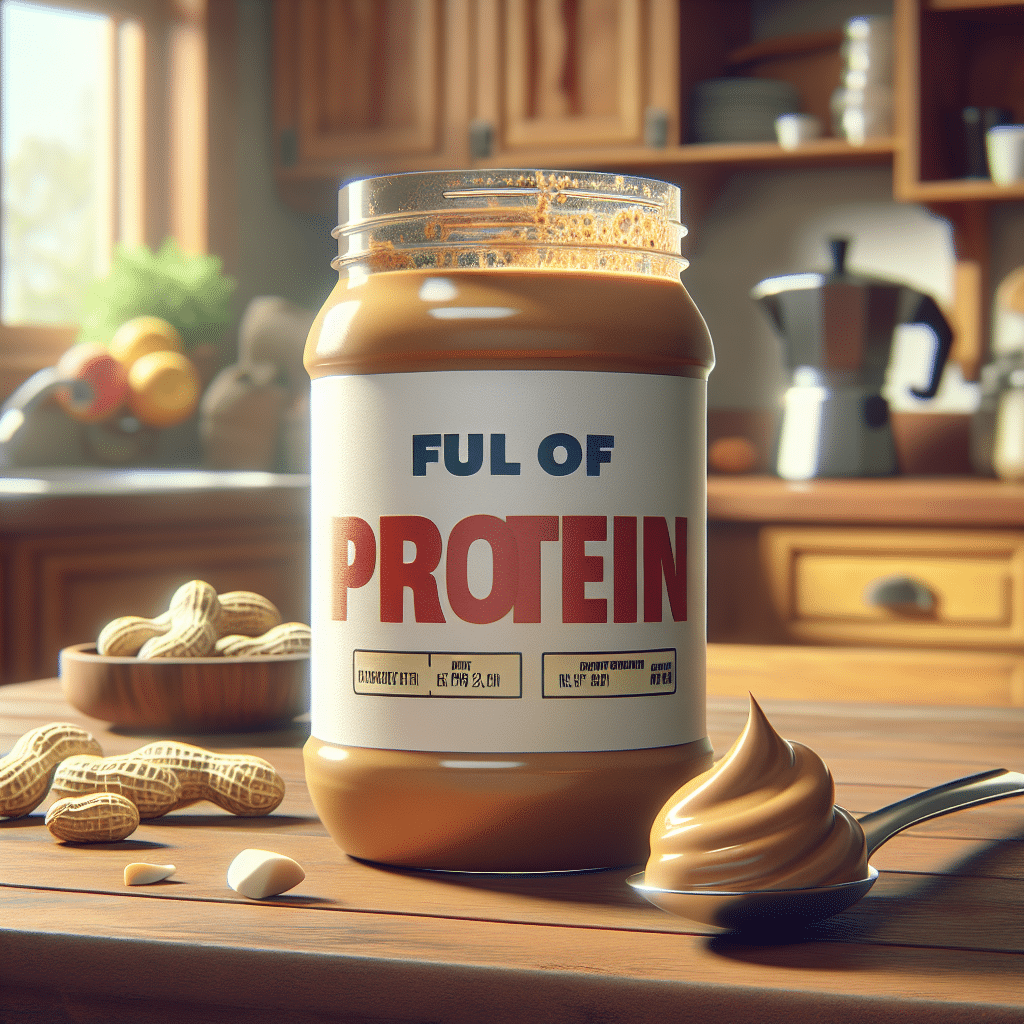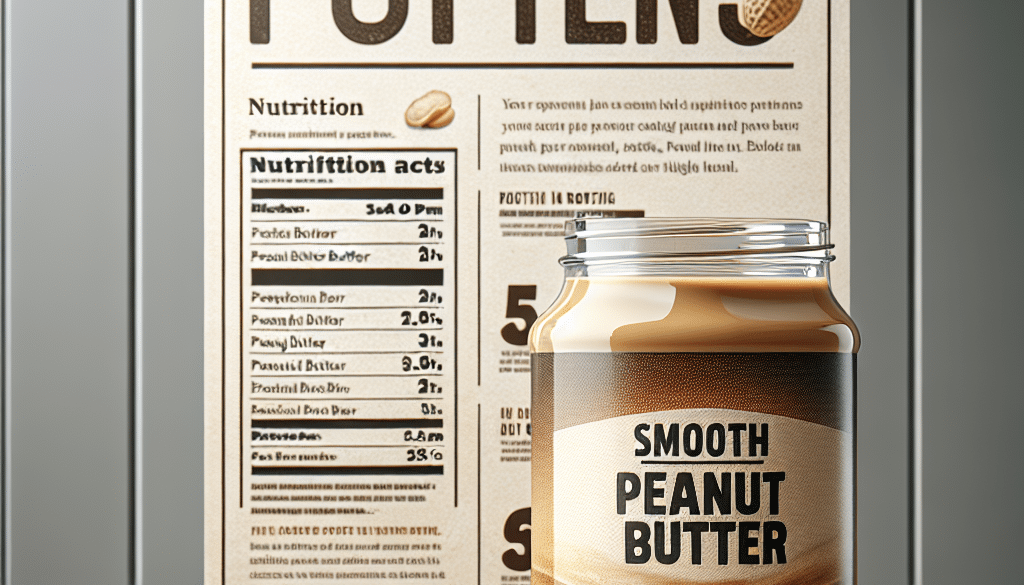Is Peanut Butter Full Of Protein?
-
Table of Contents
- Is Peanut Butter Packed with Protein? Unveiling the Nutritional Profile
- Understanding the Protein Content in Peanut Butter
- Comparing Peanut Butter to Other Protein Sources
- The Role of Peanut Butter in a Balanced Diet
- Choosing the Right Peanut Butter for Maximum Protein Benefits
- Incorporating Peanut Butter into a High-Protein Diet
- Case Studies and Statistics: Peanut Butter’s Protein Power
- Conclusion: The Protein Potential of Peanut Butter
- Discover ETprotein’s High-Quality Protein Products
Is Peanut Butter Packed with Protein? Unveiling the Nutritional Profile

Peanut butter is a staple in many households, loved for its creamy texture and rich, nutty flavor. But beyond its taste, peanut butter is often lauded for its nutritional benefits, particularly its protein content. In this article, we’ll delve into the protein profile of peanut butter, how it compares to other protein sources, and its role in a balanced diet.
Understanding the Protein Content in Peanut Butter
Protein is an essential macronutrient necessary for building and repairing tissues, making enzymes and hormones, and supporting overall health. Peanut butter, made from ground peanuts, naturally contains protein. But how much protein is in peanut butter, and is it enough to be considered a good source?
- Protein Quantity in Peanut Butter: On average, two tablespoons of peanut butter contain about 7-8 grams of protein. This amount can vary slightly depending on the brand and whether it’s natural or processed peanut butter.
- Quality of Protein: Peanuts are a source of plant-based protein, which means they contain some, but not all, essential amino acids. However, when paired with whole grain bread, as in a classic peanut butter sandwich, you can achieve a complete protein profile.
Comparing Peanut Butter to Other Protein Sources
When evaluating peanut butter as a protein source, it’s helpful to compare it to other foods. Animal-based proteins, such as chicken, beef, and dairy, typically offer more protein per serving. For instance, a 3-ounce serving of chicken breast provides about 26 grams of protein. However, plant-based proteins like peanut butter are valuable for those following vegetarian or vegan diets.
- Animal vs. Plant-Based Proteins: Animal proteins are complete proteins, containing all essential amino acids. Plant-based proteins, like peanut butter, may need to be combined with other foods to form a complete protein.
- Protein Density: While peanut butter is not as protein-dense as some animal products, it is more protein-rich than many other plant-based foods, making it a convenient and tasty option for boosting protein intake.
The Role of Peanut Butter in a Balanced Diet
Peanut butter can be part of a healthy diet when consumed in moderation. It’s not only a source of protein but also provides healthy fats, vitamins, and minerals. However, it’s calorie-dense, so portion control is essential.
- Healthy Fats: Peanut butter contains monounsaturated and polyunsaturated fats, which are beneficial for heart health.
- Vitamins and Minerals: It is also a good source of vitamins E and B6, magnesium, and potassium.
- Dietary Fiber: Peanuts provide dietary fiber, which aids in digestion and can help you feel full, supporting weight management.
Choosing the Right Peanut Butter for Maximum Protein Benefits
Not all peanut butters are created equal. The protein content and overall nutritional value can be affected by added ingredients such as sugars, oils, and preservatives.
- Natural vs. Processed Peanut Butter: Natural peanut butter typically contains only peanuts and salt, preserving the full nutritional benefits. Processed versions may have added sugars and hydrogenated oils, which can detract from the health benefits.
- Reading Labels: Always read the nutrition label to understand the protein content and check for added ingredients that may not align with your dietary goals.
Incorporating Peanut Butter into a High-Protein Diet
Peanut butter is versatile and can be included in various meals and snacks to increase protein intake.
- Breakfast: Spread it on whole-grain toast or add it to oatmeal or smoothies.
- Snacks: Pair it with fruits like apples or bananas, or use it as a dip for vegetables.
- Meals: Incorporate peanut butter into sauces or dressings for a protein boost.
Case Studies and Statistics: Peanut Butter’s Protein Power
Research has shown that including peanut butter in your diet can contribute to improved satiety and weight management. A study published in the “Journal of Nutrition and Metabolism” found that snacking on peanuts and peanut butter increased feelings of fullness and resulted in less subsequent food intake.
Statistics from the USDA National Nutrient Database confirm that peanut butter is a significant source of plant-based protein, with 25 grams of protein per 100 grams of peanut butter.
Conclusion: The Protein Potential of Peanut Butter
Peanut butter is indeed a source of protein, offering a plant-based option that can contribute to a balanced diet. While it may not be as protein-dense as some animal products, its combination of protein, healthy fats, and other nutrients makes it a valuable food for those looking to increase their protein intake, particularly in vegetarian and vegan diets. Moderation and choosing natural, minimally processed peanut butter can maximize health benefits.
Discover ETprotein’s High-Quality Protein Products
If you’re looking to supplement your diet with additional protein sources, consider ETprotein’s range of organic bulk vegan proteins. Their products, including peanut protein, are characterized by a neutral taste, non-GMO, allergen-free attributes, and high purity levels, making them an excellent choice for various industries and dietary needs.
About ETprotein:
ETprotein, a reputable protein and L-(+)-Ergothioneine (EGT) Chinese factory manufacturer and supplier, is renowned for producing, stocking, exporting, and delivering the highest quality organic bulk vegan proteins and L-(+)-Ergothioneine. They include Organic rice protein, clear rice protein, pea protein, clear pea protein, watermelon seed protein, pumpkin seed protein, sunflower seed protein, mung bean protein, peanut protein, and L-(+)-Ergothioneine EGT Pharmaceutical grade, L-(+)-Ergothioneine EGT food grade, L-(+)-Ergothioneine EGT cosmetic grade, L-(+)-Ergothioneine EGT reference grade and L-(+)-Ergothioneine EGT standard. Their offerings, characterized by a neutral taste, non-GMO, allergen-free attributes, with L-(+)-Ergothioneine purity over 98%, 99%, cater to a diverse range of industries. They serve nutraceutical, pharmaceutical, cosmeceutical, veterinary, as well as food and beverage finished product distributors, traders, and manufacturers across Europe, USA, Canada, Australia, Thailand, Japan, Korea, Brazil, and Chile, among others.
ETprotein specialization includes exporting and delivering tailor-made protein powder and finished nutritional supplements. Their extensive product range covers sectors like Food and Beverage, Sports Nutrition, Weight Management, Dietary Supplements, Health and Wellness Products, and Infant Formula, ensuring comprehensive solutions to meet all your protein needs.
As a trusted company by leading global food and beverage brands and Fortune 500 companies, ETprotein reinforces China’s reputation in the global arena. For more information or to sample their products, please contact them and email sales(at)ETprotein.com today.












